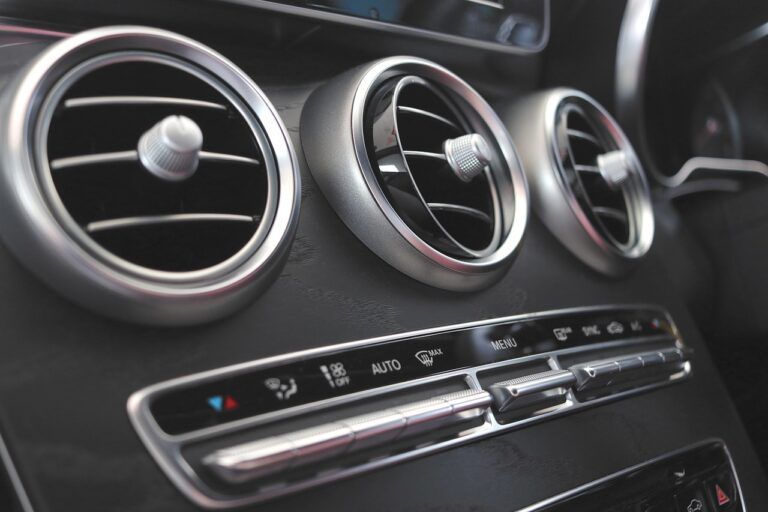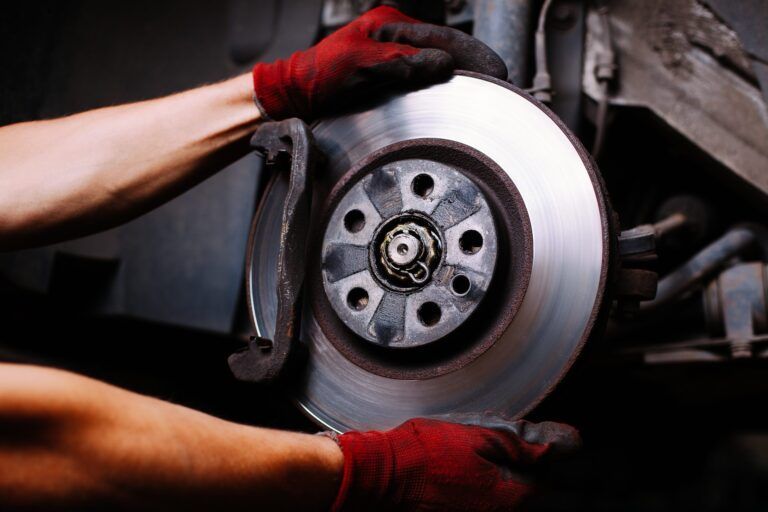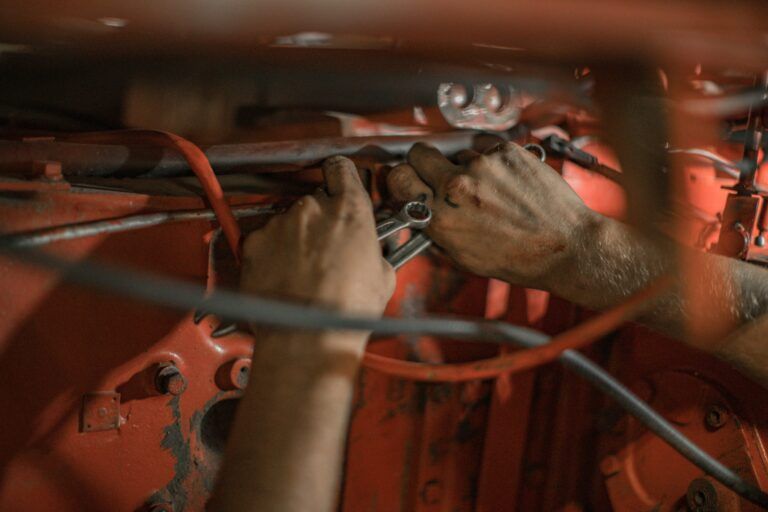BLOG
Diesel repair specialists in Del City, OK at Mike's Auto Diagnostic & Repair. Expertise and customer care. Visit us today!
Optimize your vehicle's performance with expert wheel alignment at Mike's Auto Diagnostic & Repair in Del City, OK. Experience precision and reliability. Schedule an appointment today!

As summer approaches and temperatures start to rise, having a working air conditioner in your car goes from being a luxury to being a necessity. Getting your car’s air conditioning system inspected and serviced by a professional mechanic before the summer heat hits is one of the best ways to avoid getting stuck driving around in an oven on wheels when the mercury climbs into the 90s and triple digits. Read on to find out what goes into auto AC service here at Mike’s Automotive in Del City, OK. Check Refrigerant Levels Low refrigerant levels are among the most common causes of an underperforming A/C system. Refrigerant is the fluid that circulates through the A/C components and is responsible for actually cooling the air. Over time, refrigerant can leak out through small cracks and faulty seals. A technician will thoroughly inspect the entire A/C system to check for leaks and recharge it with fresh refrigerant if needed. Examine Hoses and Belts Leaky, loose, or cracked hoses can prevent refrigerant from properly circulating through the A/C system and reduce its cooling capacity and efficiency. A mechanic will carefully check all the A/C hoses and belts, replace any worn out or damaged ones, and tighten loose connections. Properly functioning belts and hoses ensure that your A/C blows cold air all summer long. Flush Out Contaminants Particles of dirt, debris, and accumulated moisture inside an A/C system can obstruct refrigerant flow and cause components to wear out faster. A professional flush using specialized flushing solvents removes these contaminants so your A/C flows easily and runs like new again. Replace Air Filter A clean cabin air filter allows the A/C system to both circulate and cool air effectively. A clogged filter prevents air from flowing freely through the ducts and vents. Your technician can assess if your filter needs to be changed and install a new one if necessary. Recharge A/C Coolant Over time, the special coolant that runs through the A/C system components gets contaminated and breaks down. A mechanic will drain out all of the old depleted coolant and recharge the A/C system with fresh coolant, efficiently transporting heat away from refrigerant lines and enabling effective cooling. Evaluate Overall A/C Operation After servicing all the critical A/C components, a technician will fire up your newly refreshed system and assess its performance. They will check that cold air comes out of the vents at the proper temperature and make any final tweaks or adjustments so your air conditioning is optimally prepared for the harsh summer heat. Schedule Preventative Maintenance In addition to a thorough pre-summer inspection and tune-up, having routine AC servicing done at manufacturer-recommended intervals keeps your cooling system in tip-top shape for miles down the road. Your technician can suggest a customized maintenance schedule tailored to your vehicle and driving habits. Investing a little in preventative care now saves you big hassles and expenses later on. Stay Cool this Summer with a Professional Auto AC Service Getting a seasonal A/C service from a trusted, certified mechanic like those at Mike’s Automotive in Del City ensures your vehicle’s cooling system is functioning properly before oven-like temperatures hit. Call Mike’s Automotive today at (405) 670-7730 or stop by the shop to schedule comprehensive auto AC service, so you can beat the summer heat in cool comfort.

If your car doesn’t seem to be stopping as well as it should, it may be time for new brakes . Poor stopping distance isn’t the only symptom, though. You may also hear noise from the brakes when you stop, such as squealing or rubbing. Brakes can even make a grinding sound when they’re severely worn, and you don’t want them to get to that point. Instead, the best thing you can do is take your car in for an inspection at the first sign of brake problems. Since your brakes are extremely important for safety when you’re driving, you don’t want to wait to get them replaced or repaired properly. Brakes Are a Vital Part of Your Vehicle Just like your engine and transmission, your brakes are a component you can’t do without. If it’s time for new brakes, you don’t want to ignore that. Not having the ability to stop properly could put you and your passengers at risk and could also cause damage to the vehicles and property of other people. You don’t want to take the risk of injuring yourself or someone else in an accident because you can’t stop as quickly as you should be able to. Faulty, old, or worn brakes need attention, and they’re not something you can put off until later. Working with professionals to diagnose brake problems and get your brakes replaced is the right choice. Not only will you feel safer and more comfortable with new brakes, but you’ll reduce your risk of having an accident or damaging your vehicle. Brake Pads Wear Out With Time and Use Brake pads aren’t designed to last forever. Every time you use them to stop your vehicle, you wear their surface away just a little bit. If you’re braking frequently and hard, you’re wearing them out faster than if you’re braking less often and more gently. You want to work with professionals to make sure your brakes are in good shape and get any necessary advice or information on how to make them last longer. Your Rotors May Also Need Replaced Depending on the length of time you’ve had your car and the number of miles on it, you may also need to replace the rotors. If it’s time for new brakes, talk to your mechanic about the rotors, too. If there’s wear or damage, or if they’ve never been replaced before, it might be the right choice. However, you want to make sure you’re getting good value, and you don’t need to replace something that’s still in good condition. How Do You Know When It’s Time for New Brakes? There are some typical warning signs to look for that can help you determine if it’s time for new brakes, but the most common are odd sounds and an increased stopping distance. You may also find that you have to push your brake pedal harder or further to get your car to stop. Since this could also signal an issue with the brake fluid level, getting it checked out right away is important. Let Us Inspect Your Brakes Today If you’re in the Del city, OK, area, and it’s time for new brakes for your car, truck, or SUV, getting in touch with us at Mike’s Automotive is the right choice. You can give us a call at 405-670-7730 or contact us online to set up an appointment. We can inspect your brakes, let you know if they need replacement, and help diagnose other issues with your vehicle, too. Then, you can drive with confidence, knowing that your car is running well and you have the safety and protection you need.

Understanding how to prevent most vehicle problems isn’t difficult, as it can often be done through good maintenance. If you take good care of your car and have it serviced at regular intervals, it is far less likely to break down or need costly repairs. Preventative maintenance is essential for the life of your car, and you want to make sure you’re working with a trusted mechanic to help you keep your vehicle running as well as possible for more confidence anytime you drive. Change the Oil and Filter The oil and filter are among the most important areas for preventative maintenance. If you do not have them changed according to your vehicle manufacturer’s requirements, you could find that your engine is not working as well as it should. You could also shorten your car’s lifespan and end up with problems that could have been avoided. Since oil is what lubricates the moving parts of your engine, you need to make sure it’s in good shape and able to do its job correctly. Make Sure to Rotate the Tires Rotating the tires is another important part of preventative maintenance. When you have the tires rotated , they wear more evenly. That can help reduce problems with worn-down tires that do not have good traction or provide you with a comfortable ride. You want to feel confident on the road, and that is much easier to do when you know your tires are getting a good grip like they should be. Do not settle for anything less because you need tires you can trust. Take Care of Fluids, Brakes, and Alignments Our mechanic will take a good look at the alignment of your tires when they are rotated, along with the brakes. We will also check your car’s fluids to make sure you are not low on coolant or other vital fluids. You do npt want to run out of something your vehicle really needs, and you definitely do not want to do damage to your engine. Transmission fluid, brake fluid, and fluid for the wipers all need to be topped up properly if any of them are getting low. Do Not Ignore a Warning Light Warning lights are your car’s way of telling you something is not working as it should. Taking a careful look at your dashboard is part of preventative maintenance since you can see whether there are issues developing . If you have a warning light on your dash, it is time to take your car in for service. It could be something very simple or even a faulty sensor, but it could also be a big problem getting started. You want to catch that before it has the chance to get any worse. We Can Help Protect Your Car the Right Way At Mike’s Automotive, our team of experts is dedicated to providing our customers with exceptional automotive services. We understand the importance of preventative maintenance and strive to keep your car running smoothly for years to come. Our mission is driven by values such as honesty, integrity, and customer satisfaction, making us more than just an average automotive shop. With a family-operated and veteran-owned establishment, we provide transparent communication and quality services that you can trust. As your reliable partner on the road, we also offer a 3-year/36,000 Mile Warranty for your peace of mind. If you are located in Del City or South Central Oklahoma, give us a call at (405) 670-7730 or reach out to us online . We would be honored to serve you and welcome you into our family at Mike’s Automotive Service.



